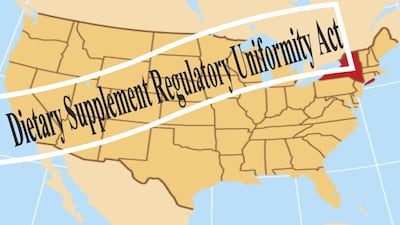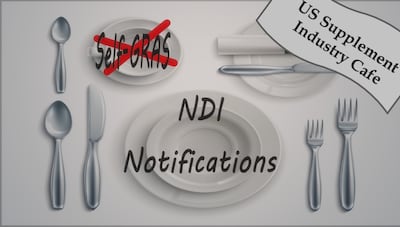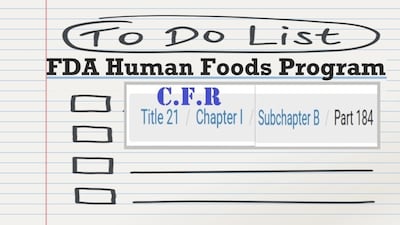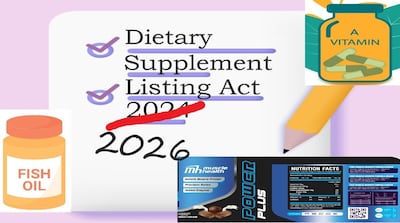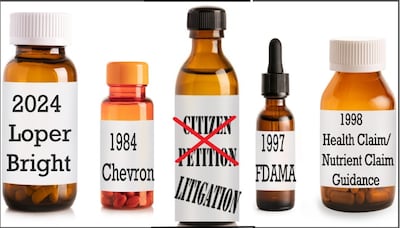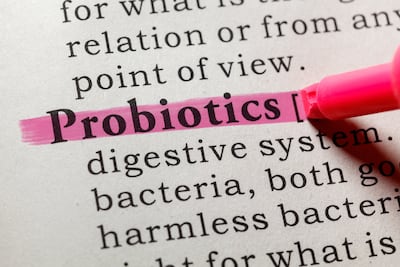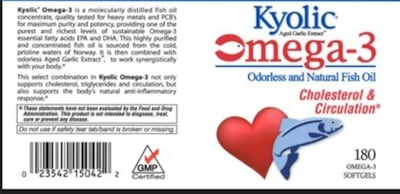Policy & Regulation
Agency exercises enforcement discretion on requirement for products to be labeled as containing artificial colors or dyes when those aren’t native to foods or ingredients, including added colors made from natural sources.
“Dietary Supplement Regulatory Uniformity Act” would prohibit states from adding requirements and rules for supplement manufacturing and sales on top of FDA regulations.
The latest round of updates to the European Commission's Novel Food Catalogue determine whether authorization is required for supplements containing certain botanical extracts.
Hawaii proposes age-restricted sales but, unlike similar bills also filed in Alaska, Massachusetts, Michigan and Washington legislatures, would require behind-the-counter storage to limit consumer access in stores.
UK rejects proposed health claim from AFT Pharma, “Green kiwifruit powder contributes to the maintenance of normal defecation.”
“FDA’s proposed GRAS rule would move GRAS closer to the NDI model in at least one key respect, which is mandatory notification,” says attorney Ashish Talati. Proposed rule isn’t expected to require removal of ingredients available through self-GRAS processes.
Changing self-GRAS regulation, providing NDIN safety and identity guidance and modernizing supplement industry regulatory framework are on FDA’s “2026 priority deliverables,” but not requirement for public listing of all supplements available.
When FDA warned Agebox about selling iKids-Growth IGF-1 Support supplements as unapproved drugs, agency along with CDC had for around a month been investigating outbreak of infant botulism linked to ByHeart formula.
FDA Human Foods Program’s list notes Kennedy’s GRAS focus as first item in “Food Chemical Safety” category, saying the agency in 2026 “will publish a proposed regulation to require the submission to FDA of GRAS notices for all substances claimed to be GRAS.”
Lawsuit filed in District of Columba federal court alleges FDA violated the authoritative statement provisions of FD&C Act, Constitutional Avoidance Doctrine and First Amendment by rejecting ANH-USA’s petition to allow 114 science-based health claims sourced directly from federal agencies.
HBW Insight’s panel of food supplement experts highlight key regulatory and legislative changes manufacturers need to keep a close eye on in 2026.
CRN’s support, a pivot from qualified backing for the previous bill, came after the senator added language to relieve firms of some responsibility around providing all claims for their products to FDA to include public-facing list.
Commissioner Martin Makary told staff that more than 400 new people are being onboarded, although where they will be placed is unclear.
HHS Secretary Kennedy says 2025-2030 guidelines “return us to the basics” and further his “Make America Healthy Again” campaign. CSPI says update “should have been based on high-quality scientific evidence, not trends, industry interests, or shifting cultural ‘wellness’ narratives.”
FDA rejects petition asking for approval to use, as health claims for supplements, nutrient–disease statements drawn directly from government publications and public-facing materials produced by NIH, CDC and other federal health agencies.
During webinar hosted by Sedgwick, regulatory experts discussed how firms can optimize engagement with FDA, especially when it comes to communicating recalls and corrective actions.
Former agency officials now representing industry worry that a deregulatory bent could be driving "Simple Reform" plan to merge all medical product and clinical research inspectorates and that specialist expertise gained in 2017 "Program Alignment" initiative will be reversed.
Only Opella’s own Enterogermina brand was found by a company-funded study to be contamination-free, to contain the claimed content, and show resistance to all tested antibiotics.
Third-Party Audit Results ‘Definitely The Direction’ For FDA Supplement Facility Inspection Planning
“There's a lot of third-party audit information out there. Could we take that and apply it into our inspectional planning process?” says Office of Dietary Supplement Programs Director Cara Welch.
“We have rarely, if ever, enforced this requirement” FDA says announcing enforcement discretion regarding requirement for disclaimer about supplement structure/function and other label claims to be printed on every panel of a product’s package.


